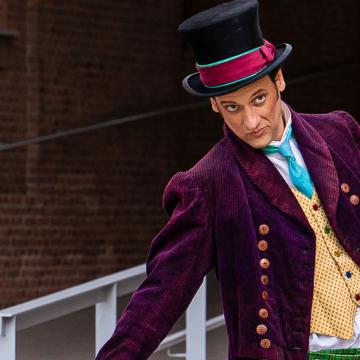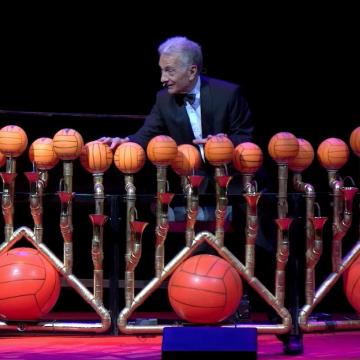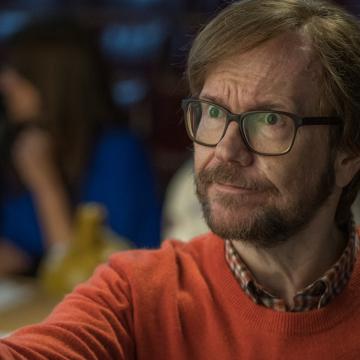Since opening on the 17th of April, Espacio Iberia has welcomed dozens of guests with one thing in common: their infinite talent. Talent that has inspired all the people who have sat there to listen to them.
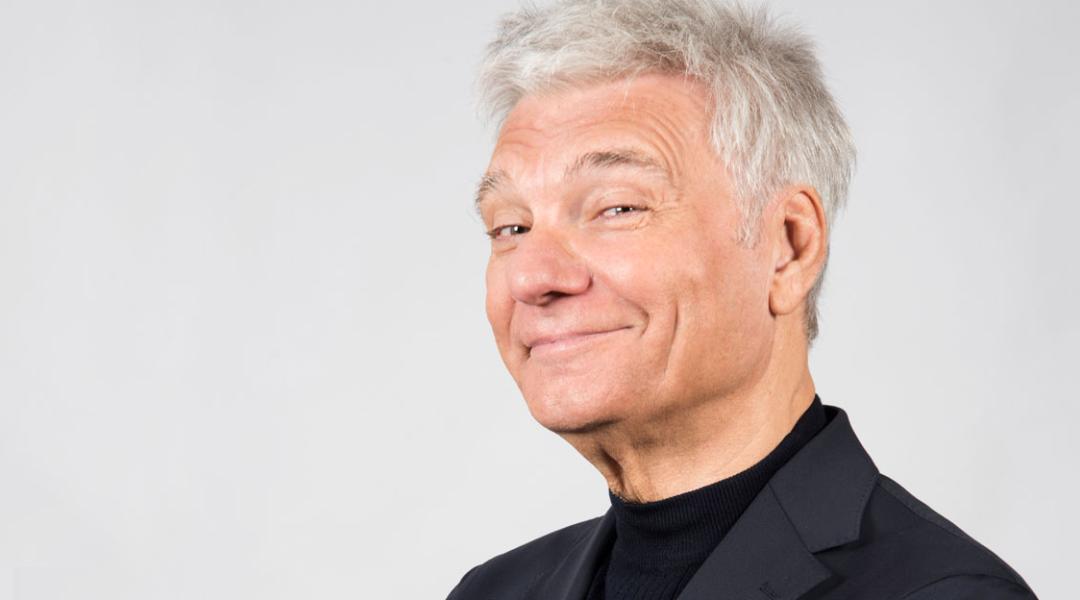
Eager to make people laugh and without disowning his past with Tricicle, Carles Sans celebrates being... alone at last! A sentiment that’s the name of his first solo performance and which feels liberating, since the artist is getting rid of the 'shackles' of slapstick humour which have been with him for more than 40 years. Indeed, he talks more than ever and makes his audience laugh like always, exactly four times per minute.
Tricicle’s farewell turned into a “see you later” for Carles Sans (Badalona, 1955). “This is my job, I’m a comedian, today and always, and that’s why I decided to start my solo career,” he confesses. With a collection of anecdotes up his sleeve — “all real, no matter how crazy they sound,” he shares—, he performs ¡Por fin solo! for his audience. During the show, the comedian steps on-stage for the first time without his Tricicle co-stars, Paco Mir and Joan Gràcia, but that’s not the only surprise: after more than 40 years of slapstick humour, he talks! The performance, which has already been a success in cities like Barcelona and Madrid, will continue to tour the rest of Spain. Take note of his upcoming dates: Seville (10th and 11th of November), Alcalá de Henares (17th and 18th of November), Xirivella (19th of November), L’Hospitalet (24th of November), Igualada (26th of November), Pamplona (2nd of December), and Falset (9th of December). He assures us that the audience laughs four times per minute. Is there a better way to round off the year?
How did a student of Law, such a boring degree (forgive me), end up doing comedy?
Yes, totally (laughs). To be honest, I wanted to become a journalist, I’d love to have been on the radio; but I didn’t do well at school, and I didn’t make the cut, so my father sent me to the Faculty of Law. There, I found myself studying something that wasn’t for me. Luckily, I crossed paths with theatre people, and I started getting into that scene. I realised that that’s what I really wanted to do. It was a giant leap.
And the joke has lasted more than 40 years; did you expect to have such a longstanding career?
No, when you start out all you think about is making a living out of this profession, which can be a bit precarious sometimes. I was happy to make it with four shows with my mates from Tricicle. I couldn’t imagine that we’d have such a long, renowned, and successful career. It worked out for us because we found a wonderful formula that the audience empathised with a lot.
“Laughter is so important to people that, even though they can laugh for free, they’re willing to pay for someone to make them laugh”
They say that laughing is good for your health, so we could almost consider you a doctor. Is laughter that powerful?
I always say that laughter is so important to people that, even though they can laugh for free, they’re willing to pay for someone to make them laugh. It’s essential for your health, especially for mental health. Having such a beautiful job fills me with pride.
In a comedy show, laughter is the barometer that measures the success or failure of a performance. Has it ever felt more like a rival than an ally?
No, because, both with Tricicle and now on my own, I’ve been lucky enough to sense what makes the audience laugh. We’ve always had a sixth sense for that, to build that sketch that causes immediate laughter. It’s a tough job, that’s why it’s so gratifying when it works.
Over the past decades, the world has changed. Has humour also changed? Do you think it needs to adapt to the times?
Indeed, humour has changed over time. If we listened to a comedian from the 19th century today, there would be things we wouldn’t find funny. Humour evolves, like everything in life. Nevertheless, I believe that we still laugh at the same things. Currently, there’s a greater awareness of certain topics and, obviously, you need to adapt to that.
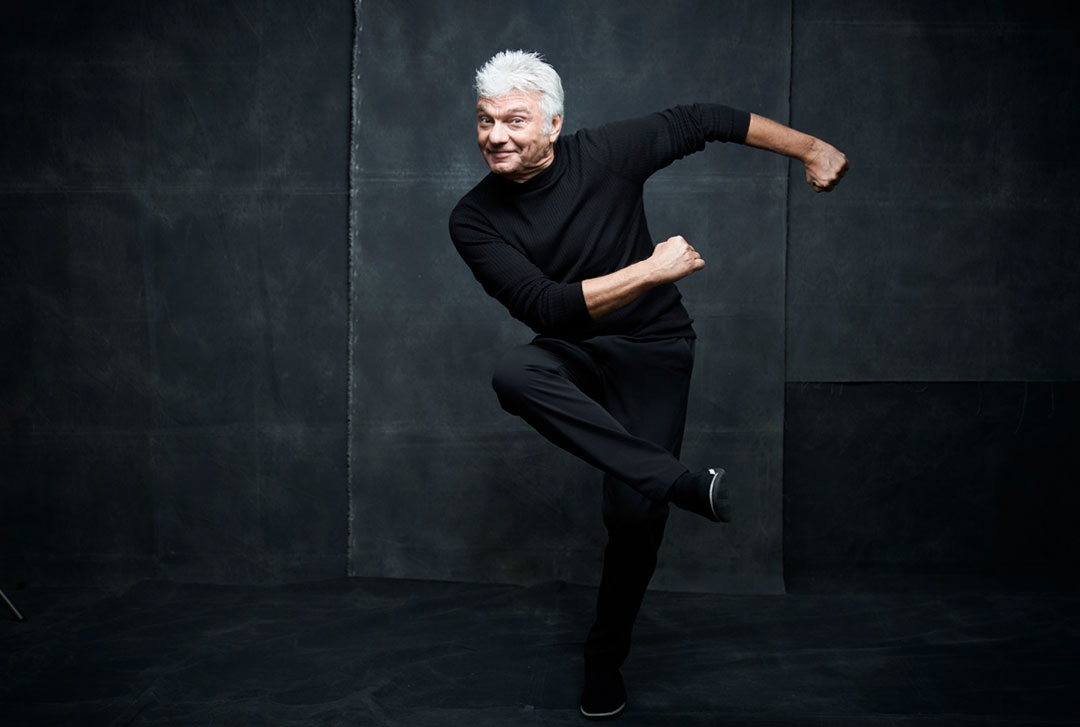
In ‘¡Por fin solo’, Carles Sans shares some of the most fun anecdotes of his career. © Elena Allende
After Tricicle’s “indefinite break”, you decide to put on your own show. What made you carry on?
When Tricicle’s career came to an end, I thought about it being the end of my career too. But this is my job, I’m a comedian, today and always, and that’s why I decided to start my solo career with ¡Por fin solo!, where I tell anecdotes from my 40 years of comedy. All real, no matter how crazy they sound, and that make the audience laugh from start to finish.
Did the doubts you might have had disappear when you got on-stage and heard people laugh as much (or even more) than with Tricicle?
Doubts, no matter how many years you’ve been doing this, are part and parcel of this job. With any project, you ask yourself if people will enjoy themselves. This time even more so because it involved a change in register, using words, and spending an hour and a half on-stage alone. All that creates uncertainty, but when you step on-stage and see that the audience can’t stop laughing, you gain confidence. Now, I’m at ease because the show is solid and has an incredible capacity to make people laugh.
In ¡Por fin solo!, you talk up a storm like you’ve never done before. Did you want to break that silence? Has the change in register been a challenge for you?
Yes, it has. I was aware that it was a gamble because, when you come from a longstanding success that has lasted years in a certain genre and decide to change direction, the audience is usually cautious, even wary of change. I understand those initial misgivings, but they disappear as soon as the show starts because they can’t stop laughing.
“In the world of comedy, talent is the ability to discover something that surprises the audience”
And you tell lots of stories from your time with Tricicle. Have you left any out? Can we expect ¡Por fin solo 2!?
Yes, I’ve left some out, due to time restraints. I believe a comedy act should last an hour and a half at most. Will there be a part 2? I’m not even thinking about it. Right now, I’m enjoying this adventure, and this isn’t the end of my professional career because I feel strong and capable, but I’m not sure if with ¡Por fin solo 2!, because there’s material to spare, or with something different. Time will tell.
Lots of people have probably asked you about being alone on-stage. But, what about in the dressing room? What are those moments before the show like?
With Tricicle, the three of us used to share the same dressing room. It was a habit we picked up at the beginning and splitting up never occurred to us. I’ve gone from that to experiencing my dressing room in solitude. I usually get there about an hour before the curtain goes up and it is during those initial quiet moments that I miss my colleagues. But this is part of being an actor.
In theatre, what requires more talent: making people laugh or cry?
The eternal question. Both are difficult, but I think making people laugh is harder. Because laughter cannot be forced; it appears naturally and spontaneously. Nobody fakes laughter at a theatre. If someone laughs, it’s because you’ve really made them laugh. Laughter is the sincerest, the most honest, and the hardest emotion to draw from the audience.
And where does talent lie in humour?
In the world of comedy, talent is the ability to discover something that surprises and seduces the audience. Today it’s really hard to surprise people and comedy is largely based on that.
